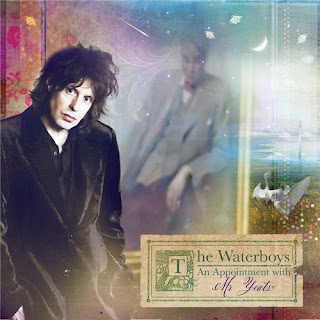Wednesday, 21 September 2011
The Waterboys - An Appointment With Mr Yeats
Speaking of poetry and music in the previous post, I should mention this altogether more ambitious and literary example which is Mike Scott's long-held and now realised ambition to set music to the poetry of W B Yeats, having had occasional dabblings and then presented as a concert experience only.
I've never been a Waterboys/Mike Scott fan - don't know way, just haven't taken to the folkanthem style, or perhaps just not heard enough to make an informed judgement. I'm impressed with this album but I'd be dishonest in saying that I enjoy it wholly as music. However, at a time when I have been arguing against slovenly singing I should applaud the precise enunciation of Scott's singing here - the very least he could do in honour of such brilliant, evocative writing - and it is challenging but ultimately rewarding to listen to such sustained intrigue and quality in a set of lyrics. The precision and clarity works well, for example, in Song of Wandering Aengus, and perhaps the slower pace allows the listener to follow and absorb. I'm listening now as I write and this is actually a lovely song and I need to listen to the whole album more so consider this review - at this point - an initial impression.
A Full Moon in March is used more to provide some engaging organ swirls and then simply repeat the title as a chorus so not all tracks treat the poetry as sacrosanct. Sweet Dancer is similar is relying on repetition and is rather nondescript as a song, though the female vocal of Katie Kim does provide some variation and depth. The Lake of Innisfree is one of the better tracks with a slow steady beat and violin bee swirls turning to fuzzed lead providing a genuinely atmospheric and bluesy delivery of the famous words. September 1913 also uses wild violin and an increasingly emotive vocal to present the anger in Yeats' reflection on the Dublin Lock-out.
The two closing tracks work extremely well. Penultimate Let The Earth Bear Witness is again quite emotive in delivery with a building horn played as the song ends to its repeated lines from another voice, and here the repetition adds genuine impact. Closer The Faery's Last Song works similarly with voices echoing one another and flute accompaniment this time. It is quite simply a beautiful and gentle vehicle for the poetry and provides an ending with distant female vocals and the sound of wind blowing through the song as a final calming atmospheric statement.
And if you have been hearing the gist of my altering impressions as I continued to listen and write you'll know that I have increasingly warmed to this album.
Subscribe to:
Post Comments (Atom)

No comments:
Post a Comment